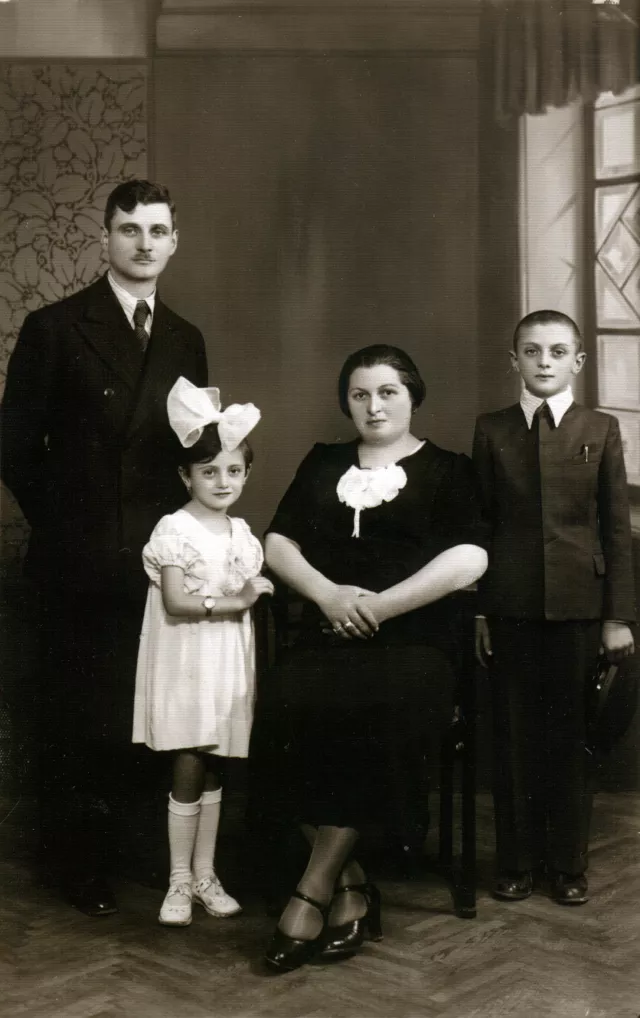This here is a photo of the Fiul family, like it was in our good times. You can see in it my father, Bernard Fiul, my mother, Dorina, and the two ?famous? children of the family: Miluta (first from right), that is me, and Lola (Eleonora), my sister. It wasn?t taken on a special occasion, we just wanted to have a photo of us, all the family together; those were our happy times, between the two World Wars. The photo was taken in a studio, and it was an ?8 days photo?, that meant that it was ready only 8 days after you took it, because the photographer retouched the negative. I remember, most of the photographers in Bacau were Jewish, but I don?t know if the one who took this particular photo was one of them.
At the time of the photo, my mother had already inherited an inn from her adoptive parents, so my father and she took care of that business. My mother was a beautiful woman, she took after her mother, who was tall and well-built. She was also very hard working; she worked side by side with my father, and their greatest achievement wasn't that they got richer, but that they gave us a good example and taught us the value of hard work and study. She dressed modestly, there was money for luxury. I remember that when she went to the synagogue on the high holidays, she was always well-dressed, she wore a hat with a veil, and had her own prayer book, with Romanian translation, which I still have, and she had her own seat in the synagogue.
My parents had a son, a boy who died at birth in 1925, and then me, on June 25th 1926. My sister, Eleonora, was born in 1930. My parents were busy with their work, and didn't have much time for education, but I think they had some pedagogical insight: my father never spoiled us when we were small, he was severe, stern, and unflinching when it came to working in the garden or the stables. Only later, when I grew up, he told me that he used to watch us sleep, and pet my hair and caress me. He did beat me, usually for pranks, not something worse than that, I was always taking uncle Bern on, because he was the funniest character in the family, and when mother found out, she always called for father to punish me: father had huge hands, the size of shovels, he would just spank me, then dust his hands and go back to work, without a word to me. Although mother was fair, and she always called for father to punish me when I did something wrong, she was the one to take care that he wouldn't hit my head or hit me too hard. Father taught us the value of hard work; when my sister and I were 11, or 12, my father told us: 'Don't expect me to support you like you were a pair of blind horses, you have to learn hard work and make a living!' Even our life at home was closely related to horses. My parents never had a holiday or a day off, for as long as they lived, and I regret it deeply; all they knew was work and more work.
Kashrut laws were observed in the house, grandmother and then mother were in charge of cooking. Speaking of kosher food, I remember that we had a wattle basket, where we let the salted meat for a while, to let all the blood come out of it. Mother and father didn't go to the synagogue on Sabbath, but we observed Friday evenings: mother lit the candles, and said the blessing. We always had that golden soup, it was called that because of all the fat, and home made bread - we had a large challah for dinner and other dishes. That challah was so good, I remember that people in Bacau used to say in Yiddish when they were happy: 'my heart is growing like a 'Piram colic', that means that their hearts were overflowing with joy like the Purim challah is growing! They had to work on Sabbath, but they did only that kind of work which was absolutely necessary, mother didn't wash, didn't clean the house.
My parents strictly observed all high holidays, however. Every holiday, that is before the war [World War II], we were happy that we could celebrate it properly - we had money for food, challah, and the like, and all the family was together-; that wasn't the case, however, after the war. My parents worked hard day after day all year round, from morning until evening. But even so, they observed the high holidays, like Purim, Chanukkah, Yom Kippur, Rosh Hashanah. We would go to the synagogue, or the 'schil' as we used to call it, in clean holiday clothes. The meals were special, of course, and we, the Jewish kids who studied in laic schools, were free as well, so that was one more reason to be happy about holidays. My parents always fasted on Yom Kippur, and I also fasted as a child, all day long: I remember I never longed more after apples or grapes than on that day.
Bernard Fiul and his family
The Centropa Collection at USHMM
The Centropa archive has been acquired by the United States Holocaust Memorial Museum in Washington, DC.
USHMM will soon offer a Special Collections page for Centropa.
Academics please note: USHMM can provide you with original language word-for-word transcripts and high resolution photographs. All publications should be credited: "From the Centropa Collection at the United States Memorial Museum in Washington, DC". Please contact collection [at] centropa.org.

























